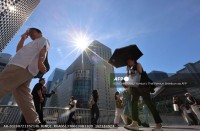WASHINGTON, United States (AFP) — US threats to put tariffs on European autos did not come up during talks this week with American trade officials in Washington, EU Trade Commissioner Phil Hogan said Thursday.
Hogan’s remarks came hours after Germany’s defense minister confirmed a media report that Washington had threatened 25 percent duties on autos, demanding that three EU nations increase pressure on Iran.
“It was not mentioned, it was hardly mentioned,” Hogan told reporters in Washington. “I think it should be good news for Germany.”
Germany, France and Britain this week formally accused Iran of breaching a multilateral 2015 nuclear pact, a week after US President Donald Trump secretly demanded that they do so, brandishing the threat of auto tariffs if they did not, The Washington Post reported Wednesday.
Tehran resumed parts of its nuclear program after Trump unilaterally withdrew from the deal in 2018.
Earlier Thursday, German Defense Minister Annegret Kramp-Karrenbauer said during a news conference that the “threat… does exist.”
But Hogan said Thursday he had learned of the reported threats through the media.
“I certainly haven’t been briefed,” he said.
Trump in 2018 began threatening to put tariffs on auto imports to defend US automakers, which alarmed Japanese and EU automakers in particular.
But Japanese automakers appeared to be in the clear after Washington and Tokyo struck a new trade accord in September of last year.
And a deadline for Trump to make a decision on the auto tariffs appeared to lapse in November without comment from the White House.
That month, Commerce Secretary Wilbur Ross — who oversaw the drafting of a report on whether US national security requirements justified such auto tariffs — raised the possibility that no tariffs would be imposed.
Hogan also said Thursday that US officials were not satisfied so far with EU efforts to resolve a dispute over subsidies to the aircraft maker Airbus.
The United States in October slapped tariffs on $7.5 billion in European exports after the World Trade Organization ruled that the subsidies were impermissible.
“But at least there’s an opinion expressed in relation to the proposal,” Hogan said, adding that Brussels was now waiting for a Trump counter-offer.
“What we share is an objective of having a comprehensive outcome in relation to civil aviation,” he said.
Agriculture is still a principal stumbling block, according to Hogan.
But he said Europeans had made good on commitments to increase imports of US soybeans and corn.
“At the request of the United States, we delivered,” he said, even on the “very sensitive issue” of agriculture,” Hogan said.
“We are trying to respond in those positive ways.”
© Agence France-Presse








